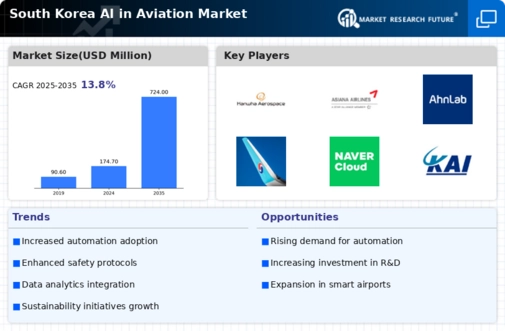Cost Reduction Initiatives
Cost efficiency remains a critical concern for airlines operating in South Korea, driving the adoption of AI technologies in the ai in-aviation market. AI applications can significantly reduce operational costs by optimizing fuel consumption, improving maintenance schedules, and automating routine tasks. For instance, predictive analytics can forecast maintenance needs, potentially reducing downtime by 30%. As airlines seek to enhance profitability, the integration of AI solutions is becoming increasingly attractive. This trend is expected to lead to a market growth rate of approximately 18% annually as airlines prioritize cost reduction strategies.
Technological Advancements in AI
The rapid evolution of artificial intelligence technologies is a primary driver for the AI in Aviation Market. In South Korea, advancements in machine learning and data analytics are enabling airlines and airports to optimize operations. For instance, AI algorithms can analyze vast amounts of flight data to enhance scheduling and reduce delays. The South Korean government has invested approximately $1.5 billion in AI research, which is expected to bolster the aviation sector. This investment is likely to lead to innovative applications in air traffic management and passenger services, thereby enhancing overall operational efficiency in the ai in-aviation market.
Regulatory Support and Frameworks
The South Korean government is actively promoting the integration of AI technologies in aviation through supportive regulations. Initiatives aimed at fostering innovation in the ai in-aviation market include streamlined approval processes for AI applications and funding for research projects. The Ministry of Land, Infrastructure and Transport has established guidelines that encourage the adoption of AI for safety and efficiency improvements. This regulatory environment is expected to facilitate the deployment of AI solutions, potentially increasing market growth by 20% over the next five years. Such support is crucial for the sustainable development of the ai in-aviation market.
Increased Focus on Safety and Security
Safety and security are paramount in the aviation industry, and the integration of AI technologies is enhancing these aspects in the ai in-aviation market. In South Korea, AI systems are being utilized for real-time threat detection and risk assessment, improving overall security protocols at airports. The implementation of AI-driven surveillance systems can potentially reduce security breaches by 25%. Furthermore, AI can assist in analyzing passenger behavior to identify potential risks. This heightened focus on safety is likely to drive investment in AI technologies, fostering growth in the ai in-aviation market.
Growing Demand for Enhanced Passenger Experience
As competition intensifies among airlines, there is a growing demand for improved passenger experiences in the ai in-aviation market. South Korean airlines are increasingly leveraging AI to personalize services, streamline check-in processes, and enhance in-flight experiences. For example, AI-driven chatbots are being deployed to assist passengers with inquiries, thereby reducing wait times. According to industry reports, airlines that implement AI solutions can expect a 15% increase in customer satisfaction ratings. This focus on passenger experience is likely to drive further investment in AI technologies, contributing to the growth of the ai in-aviation market.
















